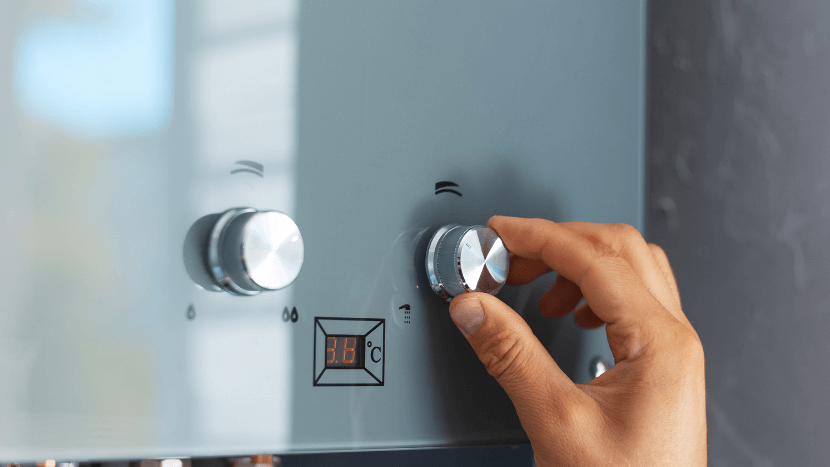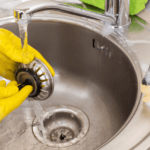
How To Extend the Life of Your Water Heater

A water heater should last at least 10-12 years on average. That’s a pretty long time, but all the same, water heaters aren’t cheap! You’re going to want to get the most life possible out of your water heater.
There are different ways to ensure the durability of your water heater. First, you can learn ways to extend the life of your water heater so that it lasts you many years. Also, you can have manufacturer-recommended maintenance performed by a reliable pro. Finally, you can learn to recognize the signs of hot water heater failure.
If you’re seeing signs of water heater failure or need a repair, call us right away!
How Long Does a Hot Water Heater Last?
A hot water heater should typically last you around 10-12 years. However, different factors can affect this. One is the type of water heater you have. For example, tankless water heaters tend to last longer than traditional ones.
Another is the quality of the unit. As the saying goes, you get what you pay for. Name brands and higher-quality units almost always last longer than budget models do.
Water quality matters as well. If your area has hard water, you can have mineral deposits build-up, shortening the life of your water heater. Maintenance is vital, as well. Regularly scheduled maintenance per manufacturer recommendations keeps your unit functioning well and identifies minor problems before they become big.
Tips for Extending the Life of Your Hot Water Heater
So, how can you get the most life out of your hot water heater? Read the following tips for insight on how to extend your hot water heater’s life and save money on repairs.
- Flush the tank regularly. Sediment builds up over time, which can cause the unit to overheat. In turn, this can lead to expensive repairs and a shorter lifespan. The typical recommendation is to flush out the tank once yearly, but if your home has hard water, you might have to do it more often.
- Monitor the pressure relief valve. This safety feature helps release pressure when the tank gets too hot. A valve that’s damaged or not working properly can rupture the tank. Checking the valve regularly is vital to ensure it works properly.
- Test water pressure. Find out what the proper city water pressure and thermal pressure levels are so that you can check them. If levels are too high, you can have a professional install a pressure regulating valve and a thermal expansion tank to help with this if your unit doesn’t already have them. A simple pressure gauge is all you need to test the water pressure, but if the pressure is too high, call a pro.
- Change the anode rod. This metal rod protects the tank from corrosion. Rusted tanks can leak and cause extensive damage to a home. If there are any leaks around the water heater or you notice a brown discoloration on the exterior walls of your tank, it might be time for a new anode rod.
- Look out for strange sounds or odors. These could indicate clogs or something no longer working correctly.
- Get better water quality. You can invest in a water softener or a filtration system if you have hard water. Your water heater will last longer, and you’ll also have better water quality. This can make a real difference since you don’t just use water for bathing but also for cooking, drinking, laundry, and more. A filtration system may still be a good idea even if you have soft water.
- Schedule professional maintenance. Again, yearly maintenance (more often if you have hard water) is vitally essential. A skilled technician can look for and/or perform everything above. Since some of these tasks are difficult or dangerous to do on your own, it makes much more sense to entrust certified & licensed plumbers.
Signs of Hot Water Heater Failure
Knowing how to get more life out of your water heater is essential, but more is needed. You also need to recognize signs of hot water heater failure to schedule a repair or replacement before something alarming happens. The following are things to watch for:
- Age. If your water heater is 8 years or older, it’s more likely to develop problems calling for a repair or a replacement.
- Leaks. Water leaking from a tank is never a good thing, and it’s one of the most obvious signs that a water heater is failing or headed that way.
- Hot water issues. Water that isn’t as hot as expected and hot water running out faster than usual are other clear signs of trouble with a water heater.
- Discolored water, unusual sounds, and smells.
- The pilot light went out. Note that this only applies to gas-powered water heaters.
If you’re experiencing any of these issues, don’t take chances on having an expensive mess to deal with. Contact a skilled technician find out what the problem is and determine whether you need a repair or a replacement.
Should I Repair or Replace My Water Heater?
If your hot water heater is older but hasn’t failed yet, you may have to decide whether to pay for repairs to keep it going as long as possible or just to get a new unit. There are 3 main things to consider.
Age is the first thing. If the heater is 8 years old or newer, repairs might make more sense. But if the unit is 10-12 years old, it’s nearing the end of its expected lifespan, and a replacement might make more sense.
You should also check the warranty. If the unit is still covered, a repair or replacement might cost you nothing, so a replacement may be the better choice.
Third, weigh the cost of repairs against that of replacement. Most repairs cost less than a new unit, but repair costs can add up over time to the point that getting a new water heater could be financially wiser.
You can count on 4 Start Plumbing Services for any repairs or replacements! Schedule maintenance with us today!
Sean Hasle is a third-generation plumber, serving the South Florida area with his family. He is a licensed plumbing, underground utility, and fire contractor.

